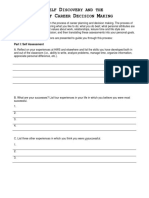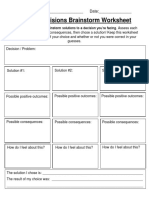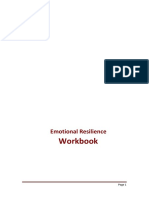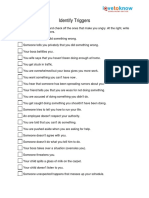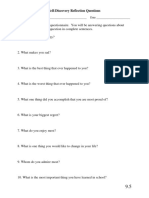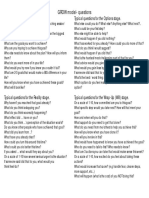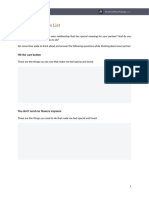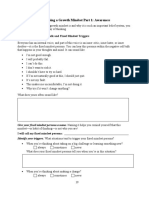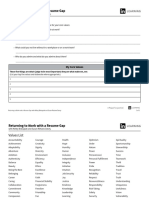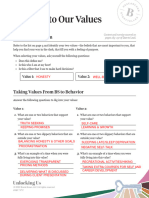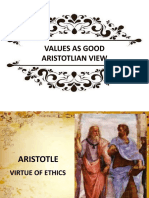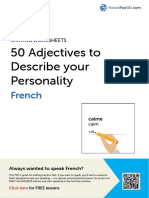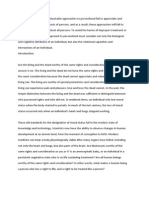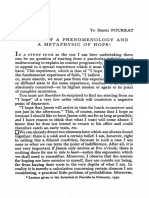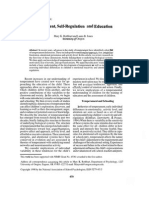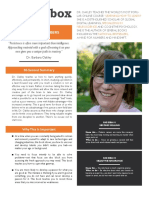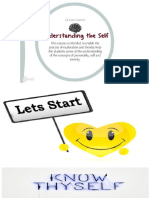Any discussion of the 16 Myers-Briggs Personality Types must begin with an understanding the
8 different Myers Briggs preferences. Each of the 16 letter combinations reveal how you
perceive and relate the world around you. Each letter means something different. Assembling
those letters together provides you with your Myers-Briggs Type.
Click here to view the complete Myers-Briggs Type table.
Source of Energy
Extraversion 'E' Introversion 'I'
The need to talk things through. The need to think things through.
Keywords: Keywords:
outgoing • talkative • sociable shy • reserved • reflective
Receiving Information
Intuition 'N' Sensing 'S'
Can see the big picture and future Trusts the establishment and the tried and
possibilities. true.
Keywords: Keywords:
brainstormer • big picture • theory facts • details • data collection
Making Decisions
Feeling 'F' Thinking 'T'
Considers others before making decisions. Uses the logical choice
Keywords: Keywords:
compassionate • personal • warm rational • black and white • tough-minded
Personal Life
Perceiving 'P' Judging 'J'
Enjoy surprises and changing plans. Loves routine and to-do lists.
Keywords: Keywords:
� go with the flow • unscheduled • flexible scheduled • structured • organized
ISTJ
Planner Inspector
ISFJ
Protector Supporter
INFJ
Foreseer Developer
INTJ
Conceptualizer Director
ISTP
Analyzer Operator
ISFP
Composer Producer
INFP
Harmonizer Clarifier
INTP
Designer Theorizer
ESTP
Promoter Executor
ESFP
Motivator Presenter
�ENFP
Discoverer Advocate
ENTP
Explorer Inventor
ESTJ
Implementor Supervisor
ESFJ
Facilitator Caretaker
ENFJ
Envisioner Mentor
ENTJ
Strategist Mobilizer
��� One of the
most popular personality tests in the world is the Myers-Briggs Type Indicator (MBTI), a psychological-
assessment system based on the work of psychologist Carl Jung. Two and a half million Americans a year
take the Myers-Briggs. Eighty-nine companies out of the US Fortune 100 make use of it, for recruitment
and selection or to help employees understand themselves or their co-workers.
The MBTI asks the candidate to answer a series of ‘forced-choice’ questions, where one choice identifies
you as belonging to one of four paired traits. The basic test takes twenty minutes, and at the end you
are presented with a precise, multi-dimensional summary of your personality. The MBTI test classifies
people into types based on 4 bi-polar dimensions;
Extraversion-Introversion (E-I)
Distinguishes a preference for focusing attention on, and drawing energy from, the outer world of
people and things versus the inner world of ideas and impressions.
Sensing-INtuition (S-N)
Distinguishes a preference for gathering data directly through the senses as facts, details, and
precedents (Sensing) versus indirectly as relationships, patterns, and possibilities (INtuition).
Thinking-Feeling (T-F)
Distinguishes a preference for deciding via objective, impersonal logic (Thinking) versus subjective,
person-centered values (Feeling).
�Judging-Perceiving (J-P)
Distinguishes an outward preference for having things planned and organized (Judging) versus a flexible
style based more on staying open to options than deciding (Perceiving).
The sixteen personality types resulting from the cross-products of these four dimensions are illustrated
below.
�� Extraverted Characteristics
Act first, think/reflect later
Feel deprived when cutoff from interaction with the outside world
Usually open to and motivated by outside world of people and things
Enjoy wide variety and change in people relationships
Introverted Characteristics
Think/reflect first, then Act
Regularly require an amount of "private time" to recharge batteries
Motivated internally, mind is sometimes so active it is "closed" to outside world
Prefer one-to-one communication and relationships
Sensing Characteristics
Mentally live in the Now, attending to present opportunities
Using common sense and creating practical solutions is automatic-instinctual
Memory recall is rich in detail of facts and past events
Best improvise from past experience
Like clear and concrete information; dislike guessing when facts are "fuzzy"
Intuitive Characteristics
� Mentally live in the Future, attending to future possibilities
Using imagination and creating/inventing new possibilities is automatic-instinctual
Memory recall emphasizes patterns, contexts, and connections
Best improvise from theoretical understanding
Comfortable with ambiguous, fuzzy data and with guessing its meaning.
Thinking Characteristics
Instinctively search for facts and logic in a decision situation.
Naturally notices tasks and work to be accomplished.
Easily able to provide an objective and critical analysis.
Accept conflict as a natural, normal part of relationships with people.
Feeling Characteristics
Instinctively employ personal feelings and impact on people in decision situations
Naturally sensitive to people needs and reactions.
Naturally seek consensus and popular opinions.
Unsettled by conflict; have almost a toxic reaction to disharmony.
Judging Characteristics
Plan many of the details in advance before moving into action.
Focus on task-related action; complete meaningful segments before moving on.
Work best and avoid stress when able to keep ahead of deadlines.
Naturally use targets, dates and standard routines to manage life.
Perceiving Characteristics
Comfortable moving into action without a plan; plan on-the-go.
Like to multitask, have variety, mix work and play.
Naturally tolerant of time pressure; work best close to the deadlines.
Instinctively avoid commitments which interfere with flexibility, freedom and variety





